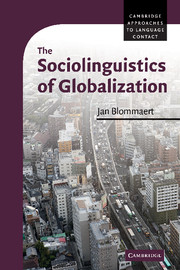Book contents
- Frontmatter
- Contents
- List of illustrations
- Series editor's foreword
- Preface
- Acknowledgements
- 1 A critical sociolinguistics of globalization
- 2 A messy new marketplace
- 3 Locality, the periphery and images of the world
- 4 Repertoires and competence
- 5 Language, globalization and history
- 6 Old and new inequalities
- 7 Reflections
- Notes
- References
- Index
6 - Old and new inequalities
Published online by Cambridge University Press: 05 June 2012
- Frontmatter
- Contents
- List of illustrations
- Series editor's foreword
- Preface
- Acknowledgements
- 1 A critical sociolinguistics of globalization
- 2 A messy new marketplace
- 3 Locality, the periphery and images of the world
- 4 Repertoires and competence
- 5 Language, globalization and history
- 6 Old and new inequalities
- 7 Reflections
- Notes
- References
- Index
Summary
Globalization, the state and inequality
According to ideologues of this era such as Francis Fukuyama (1992), the post-Cold War processes of capitalist globalization produce more wealth for more people than any other era in history. It is also an era in which the modern nation state is on its way out, and its power (supposedly concentrated hitherto, which is highly questionable) is now dissipated and distributed over a wide variety of actors and networks (Castells 1996). Power is now held, and effectively enforced, by transnational capitalist ventures, international organizations, media empires and invisible, hardly visible (and otherwise free from democratic control) consortia of decision makers meeting each year in the Swiss ski-resort Davos and other places. There is truth in both propositions – Fukuyama's claim that the end of history would also mark an increase in global wealth, and Castells' and others' claim about the nation state now sharing its power with other actors. But both propositions also invite substantial qualification. I already quoted Hobsbawm in chapter 1, who affirmed that globalization ‘has brought about a dramatic growth in economic and social inequalities both within states and internationally’ (2007: 3), and the least we can gather from his work and that of many others is that globalization generates immense wealth for some and also immense misery for others. Hobsbawm (2007) also emphasizes the importance of traditional state structures in globalization.
- Type
- Chapter
- Information
- The Sociolinguistics of Globalization , pp. 153 - 179Publisher: Cambridge University PressPrint publication year: 2010

